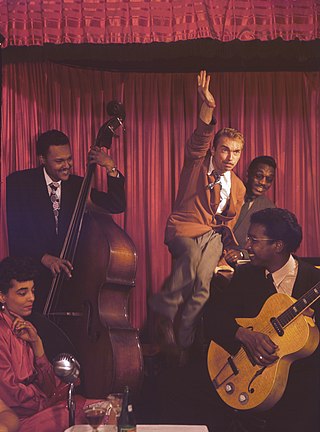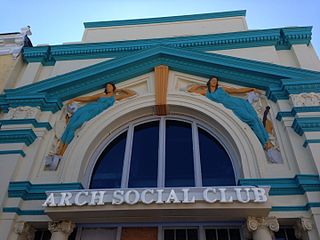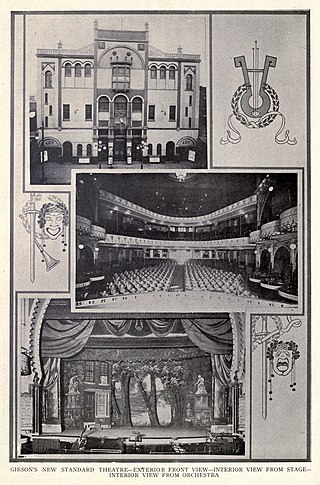
Dunbar Theatre was a 1600-seat theatre and jazz club on the corner of Lombard Street and Broad Street in Philadelphia, Pennsylvania. [1] It opened in 1919 and was later called the Gibson Theatre and Lincoln Theatre.

Dunbar Theatre was a 1600-seat theatre and jazz club on the corner of Lombard Street and Broad Street in Philadelphia, Pennsylvania. [1] It opened in 1919 and was later called the Gibson Theatre and Lincoln Theatre.
The theatre was opened on December 29, 1919 by African-American bankers E. C. Brown and Andrew Stevens, Jr. with a performance from the Lafayette Theatre group from Harlem, who were raising money for the NAACP and Marcus Garvey. They performed Shuffle Along at Dunbar, before moving to Broadway where it premiered as the first all-black cast and production. [2] Brown and Stevens ran into financial difficulty and in September 1921 [3] the theatre was acquired by businessman John T. Gibson, who bought it for $420,000, [4] offering a 10% share to another partner. [2] [5] The club, which was renamed the Gibson Theatre, along with the Standard Theatre made Gibson the wealthiest African-American in Philadelphia in the 1920s. [6]
Despite his wealth and the club's success, Gibson was ruined by The Great Depression, and the theatre was sold to Jewish owners in December 1929, [7] who renamed it the Lincoln Theatre. [2] As early as October 1928 it was announced that Irvin C. Miller would take over the theatre, known at the time as the Gibson. [8]
It flourished as a jazz venue in the 1930s and 1940s with performances from the likes of Duke Ellington, Lena Horne and the Nicholas Brothers. [2]
Today there is a historical marker sign at 500 South Broad Street on the southwest corner of Broad and Lombard Streets in the city remembering the theatre and its role in history as a successful venue for black performers of the 1920s to 1940s. [2]

Clarence Williams was an American jazz pianist, composer, promoter, vocalist, theatrical producer, and publisher.

Harry "The Hipster" Gibson, born Harry Raab, was an American jazz pianist, singer, and songwriter. He played New York style stride piano and boogie woogie while singing in a wild, unrestrained style. His music career began in the late 1920s, when, under his real name, he played stride piano in Dixieland jazz bands in Harlem. He continued to perform there throughout the 1930s, adding the barrelhouse boogie of the time to his repertoire.
Theatre Owners Booking Association, or T.O.B.A., was the vaudeville circuit for African American performers in the 1920s. The theaters mostly had white owners, though about a third of them had Black owners, including the recently restored Morton Theater in Athens, Georgia, originally operated by "Pinky" Monroe Morton, and Douglass Theatre in Macon, Georgia owned and operated by Charles Henry Douglass. Theater owners booked jazz and blues musicians and singers, comedians, and other performers, including the classically trained, such as operatic soprano Sissieretta Jones, known as "The Black Patti", for black audiences.

The Kimmel Center for the Performing Arts is a large performing arts venue at 300 South Broad Street and the corner of Spruce Street, along the stretch known as the Avenue of the Arts in Center City, Philadelphia, Pennsylvania. It is owned and operated by Kimmel Cultural Center, which also manages the Academy of Music in Philadelphia, and, as of November 2016, the Miller Theater. The center is named after philanthropist Sidney Kimmel.

Evelyn Preer, was an African American pioneering screen and stage actress, and jazz and blues singer in Hollywood during the late-1910s through the early 1930s. Preer was known within the Black community as "The First Lady of the Screen."
The Chitlin' Circuit was a collection of performance venues — "any place white people don’t go to see black people" — found throughout the eastern, southern, and upper Midwest areas of the United States. They provided commercial and cultural acceptance for African-American musicians, comedians, and other entertainers following the era of venues run by the "white-owned-and-operated Theatre Owners Booking Association (TOBA)...formed in 1921." The Chitlin Circuit sustained black musicians and dancers during the era of racial segregation in the United States from the 1930s through the '60s.

Shuffle Along is a musical composed by Eubie Blake, with lyrics by Noble Sissle and a book written by the comedy duo Flournoy Miller and Aubrey Lyles. One of the most notable all-Black hit Broadway shows, it was a landmark in African-American musical theater, credited with inspiring the Harlem Renaissance of the 1920s and '30s.

Central Avenue is a major north–south thoroughfare in the central portion of the Los Angeles, California metropolitan area. Located just to the west of the Alameda Corridor, it runs south from the eastern end of the Los Angeles Civic Center down to the east side of California State University, Dominguez Hills and terminating at East Del Amo Boulevard in Carson.

The Lafayette Theatre(1912–1951), known locally as "the House Beautiful", was one of the most famous theaters in Harlem. It was an entertainment venue located at 132nd Street and 7th Avenue in Harlem, New York. The structure was demolished in 2013.
Lincoln Theatre may refer to:

A jazz club is a venue where the primary entertainment is the performance of live jazz music, although some jazz clubs primarily focus on the study and/or promotion of jazz-music. Jazz clubs are usually a type of nightclub or bar, which is licensed to sell alcoholic beverages. Jazz clubs were in large rooms in the eras of Orchestral jazz and big band jazz, when bands were large and often augmented by a string section. Large rooms were also more common in the Swing era, because at that time, jazz was popular as a dance music, so the dancers needed space to move. With the transition to 1940s-era styles like Bebop and later styles such as soul jazz, small combos of musicians such as quartets and trios were mostly used, and the music became more of a music to listen to, rather than a form of dance music. As a result, smaller clubs with small stages became practical.

The Arch Social Club was casually founded in 1905 and officially incorporated on March 15, 1912. The club is very much a child of Baltimore's brutally repressive racial environment. Black people at the dawn of the 20th century were savagely pushed to the political, social, cultural and economic margins by a combination of white folkways and state statutes. Out of necessity, African Americans sought collective survival in the construction of a parallel civil society. Schools, churches, benevolent associations, commercial enterprises, cultural venues and every conceivable social institution that addressed the exclusionary nature of the broader white society and day-to-day needs of Black folk were forged–often in the face of de jure, race-driven harassment and humiliation.
The Erlanger Theatre was a live-performance theater at the northwest corner of 21st and Market Streets in Philadelphia, Pennsylvania. It was built in 1927 by Abraham L. Erlanger, theatrical producer and a founding member of the Theatrical Syndicate. It was demolished in 1978.

The Standard Theatre showcased Philadelphia's most talented African-American performers and jazz musicians in the early twentieth century. During its peak years (1915–1930), the Standard was one of Philadelphia's most famous and successful black theaters. Its exceptional success can be attributed to its owner, John T. Gibson, an African-American man who envisioned affordable entertainment for people of color.

The Philadelphia Tribune is the oldest continuously published African-American newspaper in the United States.
Kentucky Avenue Renaissance Festival, also known as the Historical Kentucky Avenue Renaissance Festival, is a street fair held each summer in the former black entertainment district of Atlantic City, New Jersey. Founded in 1992, it appeared annually until 2001, and then resumed in 2011. Held on and around the site of the razed Club Harlem, the weekend fair commemorates the R&B and jazz nightspots that once lined Kentucky Avenue and that attracted both black and white clientele in its heyday from the 1940s through 1960s. The festival features live performances by R&B and jazz musicians and bands, dance performances, street performers, arts and crafts for children, and food concessions, and draws hundreds of attendees.

The Renaissance Ballroom & Casino was an entertainment complex at 2341–2349 Adam Clayton Powell Jr. Boulevard in the Harlem neighborhood of Manhattan in New York City. When opened in 1921, it included a casino, ballroom, 900-seat theater, six retail stores, and a basketball arena. It spanned the entire eastern frontage of Adam Clayton Powell Jr. Boulevard between 137th and 138th Streets.

John Trusty Gibson was an African-American businessman, theatrical producer and manager and real estate investor, who was one of the pioneers of black entertainment in Philadelphia, Pennsylvania. He was the wealthiest African-American in Philadelphia in the 1920s due to his ownership of the Standard and Dunbar theatres and management of various African-American vaudeville and black musical acts. He was appointed the vice president of the Managers and Performers vaudeville circuit in 1922.

Isaac Flower Hatch, known as Ike "Yowsah" Hatch, was an American singer, pianist, and club owner, based for most of his life in Britain.